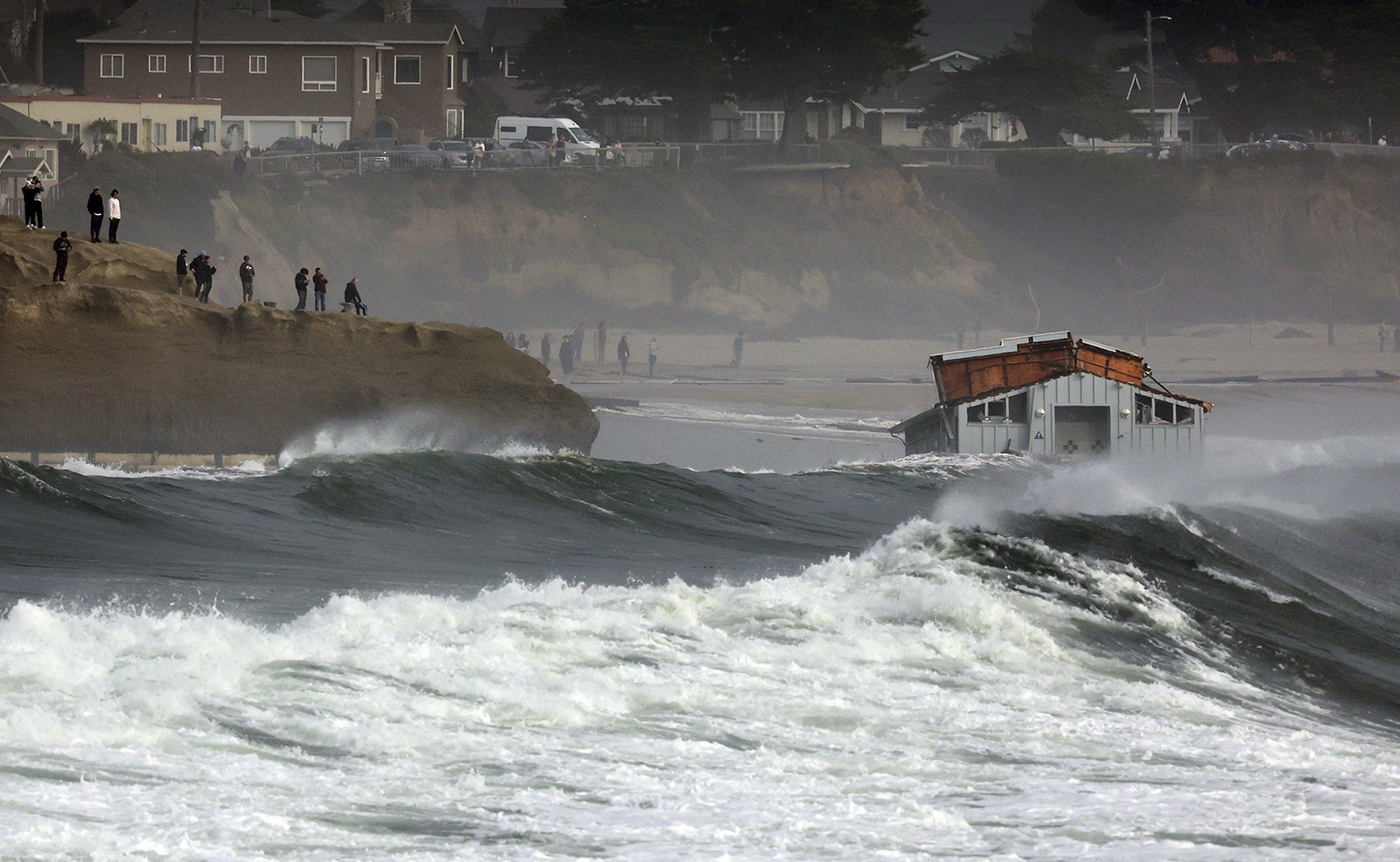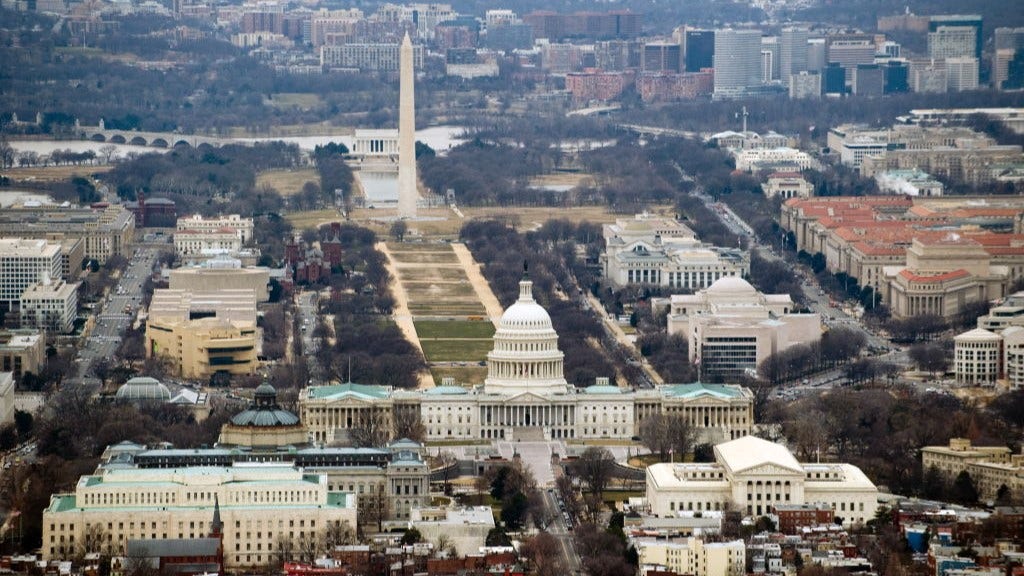California
What NOAA’s new snow maps say about California’s upcoming winter

“Snowfall during all El Niño winters (January-March) compared to the 1991-2020 average (after the long-term trend has been removed). Blue colors show more snow than average; brown shows less snow than average,” a description of the map reads from NOAA’s Climate Prediction Center. NOAA’s Climate.gov map is based on ERA5 data from 1959-2023 analyzed by Michelle L’Heureux.
NOAA Climate Prediction CenterNew maps from the National Oceanic and Atmospheric Administration show that a large part of California’s Sierra Nevada has, on average, seen above-normal snowfall during El Niño events. With a strong El Niño pattern predicted to occur this winter, you may jump to the conclusion that the Golden State could see a massive snow pile-up this year.
But Michelle L’Heureux, a physical scientist at NOAA’s Climate Prediction Center, cautions against viewing the maps as a forecast for what is likely to happen this winter. Rather, they are historical data that show how snowfall deviated from the average in winters marked by El Niño weather patterns. On the map, which uses data from 1959 to 2023, brown depicts less-than-normal snowfall and blue is above normal.
The key is to recognize that within the average, the Sierra has seen wild swings in snowfall, with some years recording above-normal snowfall and others below-normal. In fact, L’Heureux and her team found that in the Sierra, depending on the region of the mountain range, there were six to eight El Niño years with above-average snowfall and five to seven with below-average.
In those above-average years, the deviation was greater than in the below-average ones. Because of this, the big snow years dominate the map, giving the impression above-average snowfall is likely in an El Niño year. In reality, what happens in the Sierra is “more of a coin flip,” L’Heureux wrote in an email.
Advertisement
Article continues below this ad
“Snowfall during moderate-to-strong El Niño winters (January-March) compared to the 1991-2020 average (after the long-term trend has been removed). Blue colors show more snow than average; brown shows less snow than average,” a description of the map reads from NOAA’s Climate Prediction Center. NOAA’s Climate.gov map is based on ERA5 data from 1959-2023 analyzed by Michelle L’Heureux.
NOAA Climate Prediction CenterEl Niño develops in the equatorial waters of the Pacific Ocean when the trade winds ease and warm ocean water collects at the equator in the central and eastern Pacific. The warmer sea surface temperature in an El Niño year can shift the jet stream, high-altitude winds that generally move west to east over the continents. Movement in the jet stream can impact weather across the globe, especially in winter months, leading some areas to be drier and some areas to be wetter than is normal.
“The jet stream tends to extend eastward and shift southward during El Niño winters,” L’Heureux and her team wrote in a blog post featuring the maps. “You can think of the jet stream as a river of air, which carries more moisture and precipitation along the southern tier of the United States during El Niño. As a result, it is not surprising to see a stripe of increased snowfall (blue shading) over the southern half of the country.”
Sometimes in an El Niño year, the jet stream sets up in a way that brings increased snow to California, but that’s not always the case. El Niño conditions developed over summer and are expected to persist into the spring, according to the most recent forecast from the Climate Prediction Center. There’s a 75-85% chance a strong El Niño will occur November through January.
Advertisement
Article continues below this ad
“Number of years with below-average snowfall during the 13 moderate-to-strong El Niño winters (January-March average) since 1959. Red shows locations where more than half the years had below-average snowfall; gray areas below-average snowfall less than half the time,” a description of the map reads from NOAA’s Climate Prediction Center. NOAA’s Climate.gov map is based on ERA5 data from 1959-2023 analyzed by Michelle L’Heureux.
NOAA Climate Prediction CenterCalifornia state climatologist Michael Anderson called the new maps “a great data product for climate analyses,” but he said it’s important to understand the caveats.
“A key caveat is that the maps depict average conditions and each storm event, and each winter is likely to be different than the average,” Anderson wrote in an email. “This is particularly true for California as we are seeing more extremes on both ends of the wet/dry spectrum. In 2015 (a weak El Niño year), California had its lowest snowpack on record, while in 2019 (a weak to moderate El Niño year), California experienced one of the 5 largest snowpacks on record. The super El Niño of 2016 produced the only near-average snowpack in the past decade. This variability can’t be ignored in California.
“Bottom line, the new data set is a great way to map snowfall across North America and evaluate changes as the world warms, but averages associated with El Nino and Southern Oscillation phases are not always good predictors for seasonal outcomes for California.”
Advertisement
Article continues below this ad
Anderson said the Department of Water Resources is working with a team of researchers to explore how to produce “more skillful” long-range season outlooks for the state that incorporate other climate influences, including weather patterns beyond El Niño and the inverse La Niña. The Madden-Julian Oscillation, marked by thunderstorms that circle the equator and help foster storms, may have helped drive the historically wet 2022-23 winter.
Until more accurate outlooks are available for California, it’s good to be prepared for any of one three scenarios in the Sierra: above-normal, below normal or even ordinary, normal snowfall.

California
Winning $1.22 billion Mega Millions ticket sold in Northern California

Winning $1.22B Mega Millions ticket sold in California
One Californian has plenty of dough to ring in the New Year after drawing the winning number. After three months without anyone winning the top prize, a ticket worth an estimated $1.22 billion was sold for the drawing Friday night.
One Californian has plenty of dough to ring in the New Year after drawing the winning number. After three months without anyone winning the top prize, a ticket worth an estimated $1.22 billion was sold for the drawing Friday night.
According to the California State Lottery, the jackpot ticket was sold in Cottonwood, within Shasta County limits. Two other 5 out of 5 winning tickets were sold in California; one in Roseville and another in San Bernardino.
The winner matched the white balls 3, 7, 37, 49, 55 and the gold Mega Ball 6. The identity of the winner was not immediately known.
The total amount of the Mega Millions jackpot would only be distributed to a winner who chooses an annuity paid over 29 years. Nearly all grand prize winners opt to take a cash payout, which for Friday night’s drawing is an estimated $549.7 million.
Despite the game’s long odds of 1 in 302.6 million, players continued to purchase tickets as the size of the grand prize grew. Until Friday, the last time a Mega Millions player hit the top prize was Sept. 10.
The largest-ever Mega Millions jackpot ticket worth $1.6 billion was sold in Florida in August 2023. Two prizes for its compatriot Powerball lottery have been larger.
Mega Millions and Powerball are sold in 45 states, as well as Washington, D.C., and the U.S. Virgin Islands. Powerball also is sold in Puerto Rico.
KTVU contributed to this report.
California
State of California confirms an increase in Social Security payments as of Dec. 30

The State of California has confirmed that Social Security beneficiaries will receive an increase in their payments beginning December 30, 2024. This 2.5% increase is part of the Cost of Living Adjustment (COLA) applied across the United States for 2025. The COLA is based on inflation rates to ensure beneficiaries maintain their purchasing power.
The December 30, 2024 Payment
The first payment reflecting this increase will be for Supplemental Security Income (SSI). Normally scheduled for January 1, this payment has been moved to December 30 due to the New Year’s Day holiday. This adjustment benefits millions in California and across the country, particularly those who rely on these funds for basic needs.
Types of Social Security Benefits
The Social Security program encompasses several types of benefits, all of which will see the 2.5% increase:
- Retirement Benefits: For individuals who have reached retirement age and contributed to the system during their working years.
- Disability Insurance (SSDI): For individuals unable to work due to a long-term disability.
- Supplemental Security Income (SSI): For low-income individuals, including seniors and people with disabilities.
- Survivor Benefits: Payments made to family members of deceased workers.
January 2025 Payment Schedule
Social Security payments are distributed based on the beneficiary’s birthdate. Here is the schedule for January 2025:
- January 3: Payments for those who receive benefits before May 1997 or who also receive SSI.
- January 8: Beneficiaries born between the 1st and 10th of the month.
- January 15: Beneficiaries born between the 11th and 20th of the month.
- January 22: Beneficiaries born between the 21st and 31st of the month.
The COLA increase will be reflected in all these payments.
Impact in California and Nationwide
California, home to more than 6 million Social Security beneficiaries, will see a significant impact from this adjustment. However, the increase is a nationwide policy benefiting over 70 million recipients across the United States.
This adjustment aims to ease the financial burden on Americans as they face rising living costs, reinforcing the commitment to support the nation’s most vulnerable citizens.
For more details about your payments, you can visit the official Social Security Administration (SSA) website.
California
Scientists document carnivorous squirrels in California who hunt voles : Short Wave

Squirrels are omnivores, eating nuts, fruit, small insects — and according to a study published in the Journal of Ethology — voles.
Sonja Wild, UC Davis
hide caption
toggle caption
Sonja Wild, UC Davis

Squirrels are omnivores, eating nuts, fruit, small insects — and according to a study published in the Journal of Ethology — voles.
Sonja Wild, UC Davis
Squirrels are on the hunt in the California Bay Area.
Their target: local voles.
In a study published in the Journal of Ethology, a group of California ground squirrels were found hunting, killing and eating a vole. Lead researcher and behavioral ecologist Jennifer Smith from the University of Wisconsin, Eau Claire says her team witnessed this behavior in the twelfth year of a long term study.
The local vole population boomed this year. It was five to six times bigger than normal, Smith says the squirrels took advantage of that.
But this behavior is not new. “There’s been accumulating evidence of one or two events within a species of a red squirrel taking a sparrow,” she says, also noting, “They tend to go, try to take chickens.”
But these accounts have been thought to be one-offs, generally.
With this study, the squirrels’ entire process was captured via video — and shown to be a regular part of these squirrels’ behavior.
Listen to Short Wave on Spotify and Apple Podcasts.
Listen to every episode of Short Wave sponsor-free and support our work at NPR by signing up for Short Wave+ at plus.npr.org/shortwave.
This episode was produced by Rachel Carlson and Jordan-Marie Smith and edited by Rebecca Ramirez, Christopher Intagliata and Ashley Brown. Tyler Jones checked the facts.
-
/cdn.vox-cdn.com/uploads/chorus_asset/file/24924653/236780_Google_AntiTrust_Trial_Custom_Art_CVirginia__0003_1.png)
/cdn.vox-cdn.com/uploads/chorus_asset/file/24924653/236780_Google_AntiTrust_Trial_Custom_Art_CVirginia__0003_1.png) Technology7 days ago
Technology7 days agoGoogle’s counteroffer to the government trying to break it up is unbundling Android apps
-

 News1 week ago
News1 week agoNovo Nordisk shares tumble as weight-loss drug trial data disappoints
-

 Politics1 week ago
Politics1 week agoIllegal immigrant sexually abused child in the U.S. after being removed from the country five times
-

 Entertainment1 week ago
Entertainment1 week ago'It's a little holiday gift': Inside the Weeknd's free Santa Monica show for his biggest fans
-

 Lifestyle1 week ago
Lifestyle1 week agoThink you can't dance? Get up and try these tips in our comic. We dare you!
-
/cdn.vox-cdn.com/uploads/chorus_asset/file/25672934/Metaphor_Key_Art_Horizontal.png)
/cdn.vox-cdn.com/uploads/chorus_asset/file/25672934/Metaphor_Key_Art_Horizontal.png) Technology3 days ago
Technology3 days agoThere’s a reason Metaphor: ReFantanzio’s battle music sounds as cool as it does
-

 Technology1 week ago
Technology1 week agoFox News AI Newsletter: OpenAI responds to Elon Musk's lawsuit
-

 News5 days ago
News5 days agoFrance’s new premier selects Eric Lombard as finance minister

















